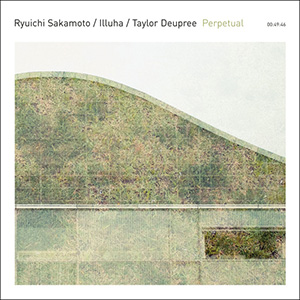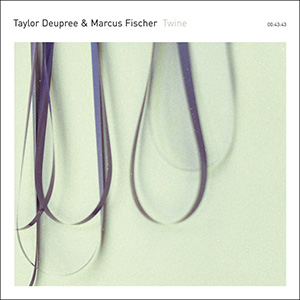 These two recent collaborations featuring Taylor Deupree capture two distinct extremes in his approach to creating music. Perpetual, his collaboration with legendary pianist Ryuichi Sakamoto and the duo of Illuha is a four-piece ensemble using piano, guitar, modular synthesizer, and other conventional instruments to create a delicate, complex and almost living composition. Twine, an in-studio performance with Marcus Fischer is a much simpler affair, with the two manipulating tape loops in real time, recorded live with just room microphones capturing the performance. One may be a larger production and the other an intimate performance, but both are superb documents of Deupree's (and the other performers') sense of small scale, but infinitely detailed and varied music.
These two recent collaborations featuring Taylor Deupree capture two distinct extremes in his approach to creating music. Perpetual, his collaboration with legendary pianist Ryuichi Sakamoto and the duo of Illuha is a four-piece ensemble using piano, guitar, modular synthesizer, and other conventional instruments to create a delicate, complex and almost living composition. Twine, an in-studio performance with Marcus Fischer is a much simpler affair, with the two manipulating tape loops in real time, recorded live with just room microphones capturing the performance. One may be a larger production and the other an intimate performance, but both are superb documents of Deupree's (and the other performers') sense of small scale, but infinitely detailed and varied music.
Perpetual is presented as a three movement composition that progresses adeptly from soft melodies and tones into a wider reaching feel of dissonance, then back to spacious, open, and beautiful music.The first movement has the quartet generating delicate, warm layers from their stringed and synthetic instruments.Fragments of voice, and a bit of electronic buzzing offset the carefully interplaying frequencies, resulting in a lush, tone-heavy arrangement of sound.
The second part still features Sakamoto's distinctive piano, but his playing focuses on the lowest notes and the recording perfectly capturing the metallic, vibrating dissonance of the strings.This hint of chaos sets the stage for the remainder of the piece.Odd noises and unexpectedly bleak music box sounds appear, withe the artists blending organic and electronic sources extremely well.Deupree's modular synthesizer performance introduces just the right amount of chirps and noisy scrapes to give the piece an appropriately hollow, slightly bleak feel.The final movement is a natural progression from the previous, where the artists begin with clattering sounds, but they bring the sound back to the opening via pure guitar and piano sounds, creating a spacious, yet delicate sound.
samples:
 The comparatively stripped down arrangements Deupree and Marcus Fischer create on Twine result in compositions that are not quite as varied or diverse, but unsurprisingly they pull refined beauty from the two lengths of magnetic tape they manipulate.Some of the compositions are largely defined by the imperfections and idiosyncrasies of the recording medium they work with rather than what is pre-recorded."Bell" would seem to be based on recordings of, well, bells, but the specifically discernible sounds are all buried under the noise of tape.What may be a simple series of repeated tones become something much more captivating as they work in crackling and distortion in addition to the sounds from the manipulated tape.On "Draw" the duo utilize the wavering, inconsistent tones that can be culled from analog equipment to excellent effect.
The comparatively stripped down arrangements Deupree and Marcus Fischer create on Twine result in compositions that are not quite as varied or diverse, but unsurprisingly they pull refined beauty from the two lengths of magnetic tape they manipulate.Some of the compositions are largely defined by the imperfections and idiosyncrasies of the recording medium they work with rather than what is pre-recorded."Bell" would seem to be based on recordings of, well, bells, but the specifically discernible sounds are all buried under the noise of tape.What may be a simple series of repeated tones become something much more captivating as they work in crackling and distortion in addition to the sounds from the manipulated tape.On "Draw" the duo utilize the wavering, inconsistent tones that can be culled from analog equipment to excellent effect.
"Buoy" is another example where the two put a greater emphasis on the sound of the equipment more than the existing recordings.With a bit of buzz and some metallic knocking (which I just assume is the mechanics of the tape players they are using), soft notes contrast the equipment's jagged looseness and imperfections very well."Sailmaker" too has Deupree and Fischer just barely flirting with melody; instead the slowed down sounds and mechanical noises becoming the focus of the piece.It is only on "Telegraph" and "Wake" where the recorded source material seems to be the focus of the compositions.The former sounds again like the two manipulating loops of bells and chimes, but the focus is placed more on these gentle sounds as opposed to manipulating the delivery system."Wake" closes the album, and there seems to be clearer sounds of guitar or other stringed instruments coming through the mix, with lots of open space and incidental sounds within the loops.There is not a lot of raw material utilized in the piece, but the duo generate amazing sounds and moods from that basic formula.
Taylor Deupree has done an amazing job at curating the 12k label since its inception, presenting music that may not always be similar to his, but always reflects his ear for rich compositions created from the most hushed of sounds.Whenever he does release his own work, however, the result is never a disappointment and just a reiteration of his expertise at this style of composition.These two albums may differ in their methods and composition techniques, but that common thread between them, Deupree himself, is what makes for two beautiful, understated compositions that do so much with the barest of sonic ingredients.
samples:
 
Read More

